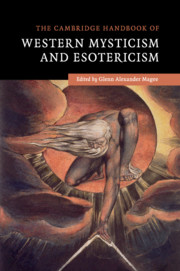Book contents
- Frontmatter
- Dedication
- Contents
- Acknowledgments
- Editor's Introduction
- List of contributors
- I ANTIQUITY
- II THE MIDDLE AGES
- III THE RENAISSANCE AND EARLY MODERNITY
- IV THE NINETEENTH CENTURY AND BEYOND
- 20 Spiritualism
- 21 H. P. Blavatsky and Theosophy
- 22 Rudolf Steiner and Anthroposophy
- 23 The Golden Dawn and the O.T.O.
- 24 G. I. Gurdjieff and the Fourth Way
- 25 C. G. Jung and Jungianism
- 26 René Guénon and Traditionalism
- 27 Via Negativa in the Twentieth Century
- 28 Contemporary Paganism
- 29 The New Age
- V COMMON THREADS
- Suggestions for Further Reading
- Index
- References
23 - The Golden Dawn and the O.T.O.
from IV - THE NINETEENTH CENTURY AND BEYOND
Published online by Cambridge University Press: 05 May 2016
- Frontmatter
- Dedication
- Contents
- Acknowledgments
- Editor's Introduction
- List of contributors
- I ANTIQUITY
- II THE MIDDLE AGES
- III THE RENAISSANCE AND EARLY MODERNITY
- IV THE NINETEENTH CENTURY AND BEYOND
- 20 Spiritualism
- 21 H. P. Blavatsky and Theosophy
- 22 Rudolf Steiner and Anthroposophy
- 23 The Golden Dawn and the O.T.O.
- 24 G. I. Gurdjieff and the Fourth Way
- 25 C. G. Jung and Jungianism
- 26 René Guénon and Traditionalism
- 27 Via Negativa in the Twentieth Century
- 28 Contemporary Paganism
- 29 The New Age
- V COMMON THREADS
- Suggestions for Further Reading
- Index
- References
Summary
Introduction: Magic in an Institutional Setting
The Golden Dawn and the O.T.O. share a place in the history of Western esotericism because of their importance in reshaping conceptions of magic and relocating it to the context of institutionalized esoteric societies. While the practice of other occult arts (notably alchemy) has a long institutional history, the practice of ritual magic had typically remained a solitary pursuit. A link between masonry and theurgy had existed in Martinès de Pasqually's (1727–1774) eighteenth-century Order of Élus Coëns, but nineteenth-century occultists tended to view the teaching and practice of magic as an entirely private affair.
Both orders discussed in this essay illustrate a move toward creating new social and institutional sites for magic by reconceptualizing the esoteric order as a vehicle for magical teachings. As sources for the production and dissemination of new syntheses of magic, both the Golden Dawn and the O.T.O. have exerted a profound influence on twentieth-century esoteric trends.
The Hermetic Order of the Golden Dawn
a Birth of a Magical Order
During its short lifespan from 1888 to 1903, the “classical” Hermetic Order of the Golden Dawn was the pivotal esoteric order in fin-de-siècle Britain. Despite its quick lapse into disorder and schism, it managed to create a social platform for the study and practice of ritual magic, operating four temples in England and one in Paris. Among the better known members were the poet William Butler Yeats; the actresses Florence Farr and Maud Gonne; and Mina Bergson Mathers, the sister of philosopher and Nobel laureate Henri Bergson.
The order was established by a small coterie of London-based Freemasons and occultists. The key founders were the coroner William Wynn Westcott (1848–1925) and Samuel Liddell “MacGregor” Mathers (1854–1918), both members of the Rosicrucian Masonic group Societas Rosicruciana in Anglia (S.R.I.A.). William Robert Woodman (1828–1891), Supreme Magus of the S.R.I.A., was invited in as the third chief, but he died shortly thereafter. The Golden Dawn culled many of its early members from Rosicrucian- and Hermetic-oriented parts of the occult milieu. Like Anna Kingsford's Hermetic Society (then only recently defunct), it presented itself as a decidedly Western alternative to the increasingly Oriental and anti-Christian Theosophical Society, claiming an authentic Rosicrucian heritage and reinstating Egypt as the true origin of perennial wisdom.
- Type
- Chapter
- Information
- The Cambridge Handbook of Western Mysticism and Esotericism , pp. 272 - 283Publisher: Cambridge University PressPrint publication year: 2016



